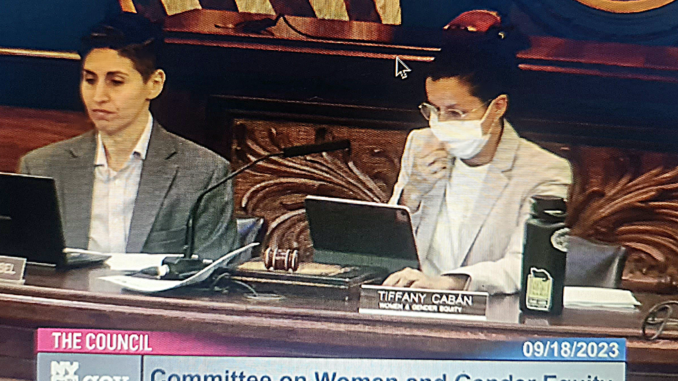
BY JADA SIMON
Concerned that city schools and prisons are not doing enough to provide menstrual products to the communities they serve, the New York City Council Committee on Women and Gender Equity grilled city agencies on their performance at a hearing on September 18. The council is considering updating a 2016 law governing distribution of these products, and heard testimony indicating that products are not available in ways that the law intended.
“Just to give some examples of multiple reports that we’ve gotten, some made by students who were provided inappropriately adult-sized products, for example, some by incarcerated vigils who have received pads more suitable for wounds than menstruation and some by shelter clients who have had to use multiple products at once to prevent leakage,” said said NYC Council Member and the chair of the Women and Gender Equity Committee, Tiffany Caban of Queens.
The meeting addressed five main points: annual reporting from both the Department of Education (DOE) and the Department of Corrections (DOC) on provisions of menstrual products; expansion of the number of schools providing menstrual products to include grades four and five; requiring Department of Mental Health and Hygiene to create written educational material on feminine hygiene products; and to include menstrual cups in the category of feminine hygiene products. In addition, council member Caban said that from now on these products should be provided to gender expansive individuals.
“Throughout this hearing let us keep trans, non-binary, intersex and other gender expansive New Yorkers in our minds and hearts,” said council member Caban.
To discuss these topics, the Committee on Women and Gender Equity invited the DOE, DOC, Department of Citywide Administrative Services (DCAS) and members of the public to discuss how each division will carry out proper distribution of menstrual products moving forward.
First up was a representative of DCAS. DCAS stores sanitary napkins and pads to provide it for any agency as needed, but no tampons. It was agreed that upon instruction from the city, DCAS is willing to begin storing tampons.
“If a requirement for DCAS to store and supply these products is made clear, we would procure as needed,” said the representative.
Kat Thompson, Chief of Staff of DOC, initially appeared proud to mention that forms were provided to inmates so that prisons could keep track of who needed sanitary products. Council members Tiffany Caban and Amanda Farias still had concerns.
Caban pointed out that pads were free but tampons were quite costly. Thompson said that a 40-pack of tampons costs $15.60 and a 10-pack, $3.90, while inmates only make roughly $0.55 to $1.55/hour.
“So if a person who menstruates needs to buy tampons they would have to possibly work 15 hours to afford one box of tampons and that is not including maybe getting extra calories they need through commissary or other hygiene products or anything else that they might need to apply for through commissary that they can’t get through jail,” said council member Caban.
When asked how this pricing compares to local stores, Thompson had no answer, but she did mention that DOC would work towards making tampons free for prisoners if an appropriate price could not be agreed upon. But it didn’t stop there.
Council member Amanda Farias, sponsor of a bill on ensuring menstrual cups are considered a feminine hygiene product, questioned why menstrual cups also weren’t offered to prisoners. Previously, Thompson said, the concern was that the menstrual cups would be misused for “contraband, secretion and lighting drugs.” After council member Farias proposed using disposable menstrual cups, the Chief of Staff said that she’d be willing to have a discussion about implementing those products moving forward.
Representatives of the Department of Mental Health and Hygiene said that they have been providing brochures called “Period Facts” to schools for children in grades 6 through 12. Farias recommended requiring distribution of these brochures to schools, because under the current system only 11 schools have asked for them.
The department also said that it confirmed with principals that their schools have enough tampons in their dispensaries, but council member Farias expressed having a different experience. “When I mean I’ve gone into every bathroom in the school that I visited and there’s not a single menstrual product available,” said Farias. “My question lies with how we are actually enforcing it and ensuring that principals understand that free accessible products are indeed mandated by law for our students and it needs to be followed.”
There was also public testimony that questioned how the DOE claims to have no knowledge of these empty dispensaries in schools.
“I guess I was just a little bit concerned by this seeming surprise of the DOE administration, seeming to insinuate that they didn’t know that dispensers were not working properly or to alert them if a schools dispensers weren’t working properly,” said Susan Herman, an employee at Period Law, a non-profit based in New York. “I know anecdotally and I know that you all know that it would be easier to name the schools where they are working properly, right?”
Council member Carmen De La Rosa also added that the Department of Mental Health and Hygiene’s need to take into consideration the menstruators in fourth and fifth grade, for whom the department said they could make adjustments.
By the end of the meeting, each agency seemed clear on the notes the council gave them to work on and said they were willing to make the necessary changes to accommodate everyone who menstruates.
